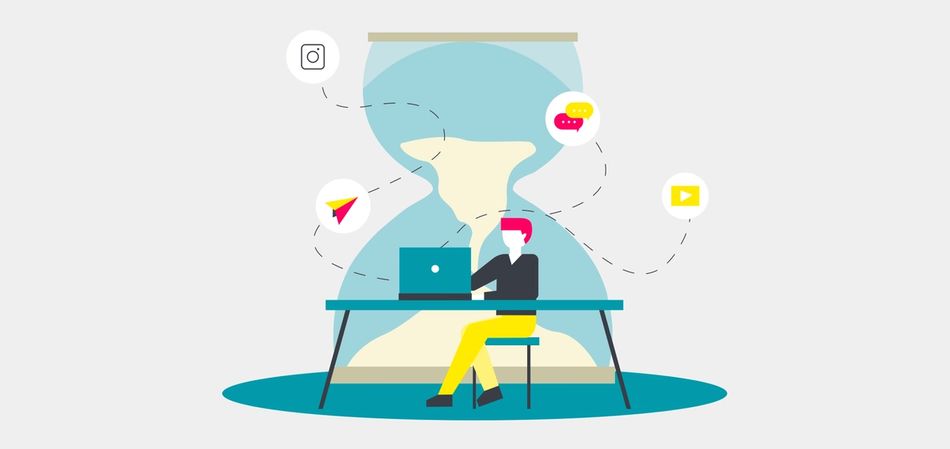
It’s hard to tell if human attention spans are decreasing to less than that of a goldfish, or our attention is simply evolving to be more selective. However, you might interpret the data in reports from Microsoft and [Prezi, it’s clear that attention is a limited resource.
Now consider all of the ways in which we can be distracted at work: phones, email, messaging services, coworkers, unfettered access to the internet. It’s no wonder Udemy’s 2018 Report on Workplace Distractions revealed that 69% of workers admit to being distracted at work. What’s surprising is that the number isn’t higher.
Workplace distractions have a very real impact on our ability to perform. The report found that:
- 54% of respondents said they weren’t performing as well as they should
- 50% were significantly less productive
- 20% believed they weren’t able to reach their full potential or advance their careers
We’re working faster and we’re working smarter—we just have to—but we’re also fending off a constant barrage of distractions every day. Many of those distractions come from us going about our work. But if we can get better about recognizing distractions, and if we can learn to mollify them, then we can start making greater strides toward increasing our focus and productivity in the workplace.
Common workplace distractions and why they’re such a nuisance
Look at your desk and around your workspace. (If you’re not at your desk, then picture it.) 👀 What potential distractors do you see? There’s probably a phone, not on Do Not Disturb, with its screen facing up. There are probably papers, notebooks, or sticky notes reminding you of work you ought to be tending to. There’s your computer screen with Slack messages and email notifications reminding you that someone needs an answer about something. And then there’s the office with its usual noises, including a few of your chattier coworkers.
In the workplace, distractions come with the territory.
Those are just a handful of the potential distractions we face at work. When we respond to each and every notification or entertain every coworker that stops by our desk — often thought to be the polite thing to do — we lose focus. And if that happens enough or for long enough periods of time, then our performance begins to suffer. These distractions can:
- Lower our productivity and energy
- Cause frustration that affects our quality of work
- Diminish morale
- Inhibit our ability to make sound decisions
- Increase work-related stress (which can follow us out of the office)
But you’ll notice that the distractions mentioned above are also standard ways in which we get our work done. Rarely do we need to reply to that new text message, but most of us need our phones at one time or another to do something for work. We need those notes and we need to communicate with our coworkers.
So what do we do? 🤷🏿♂️
5 ways to overcome your workplace distractions
I struggle the most with managing distractions in the times when I really need to focus. Try as I might to focus, I still get distracted and find myself doing things I shouldn’t be doing. So I wanted to share some recommendations, some of the ways in which I’ve been working to improve how I manage distractions in the workplace.
1. Turn off your phone
Or at least put it on Do Not Disturb from time to time.
Udemy’s survey found that 43% of respondents turn off their phones during work hours to help them deal with the pull their phones have over them. Whatever the interruption—text message, phone call, social media, news—it can often wait.
And our phones don’t just distract us when we’re trying to focus at our desks. We often bring them into meetings. One quick response to an alert or message from work turns into following up on personal threads that further divert our attention away from the discussion happening around us.
2. Step away from your desk
The sights and sounds of the office can make it so hard for us to maintain our focus throughout the workday. And when it’s time to get down to business, the distractions of conversations, a loud HVAC system, typing, and people moving about our workspace are magnified.
Get up, grab your laptop, and find a quieter place to work.
We can’t always prevent office stimuli from straining our attention, but we can remove ourselves from distracting settings.
Booking a meeting room to be alone for an hour or two is a great way to be proactive about managing workplace distractions. When that’s not an option, simply moving to a quieter corner of the office, or to the empty lunchroom, can make a significant difference.
3. Set an away status and turn off notifications
If after sending a message to a teammate on Slack it then takes 30 minutes or more to hear back from them, it can be a little frustrating. Maybe that person just didn’t see the message, but it’s also very likely they’ve managed their application and computer settings to prevent against these would-be distractions.
Setting an away status and temporarily turning off notifications is a really good way to minimize the number of potential distractions while working. This is especially helpful for those of us who have a tendency to immediately reply to any and every message that comes our way. If we can quiet our computers, then we can help quiet our minds.
4. Postpone flyby discussions
There are lots of benefits that come with working in an office. Having our coworkers around us, for instance, makes it possible to more quickly talk through problems, come up with solutions, and keep making progress. However, having coworkers around us all of the time can also be a very big distraction.
80% of respondents in Udemy’s survey claimed that “chatty coworkers” are the biggest distraction at work.
It happens all the time. We hit a groove, ideas are buzzing about our head, and then a coworker pops by our desk for a not-so-quick chat. Maybe they have a question about work, or maybe they just want to talk because they have a little downtime. While we have work we need to get back to, for whatever reason we choose to engage in the conversation.
It can be really hard to say no. Fortunately, in this situation, we don’t have to. 😌
A great way to be courteous to coworkers and maintain our focus the next time we’re faced with this situation is to say “I’m sorry. I’m not free right now. Can we schedule time for this later?”
5. Score an easy win to reestablish focus
Stress often hinders our ability to focus. And, not too surprisingly, not getting work done causes stress. It’s a vicious cycle, but one we might be able to break by getting a simple task or two completed and under our belt for the day.
That’s at least what 26% of survey respondents do: fill time with simple tasks that don’t require as much focus. Crossing off an easy task or two, those everyday tasks, is a great way to build focus and ease our way out of a funk. When we can start making progress—when we can start being productive again—we not only remind ourselves that we are in control, we believe it. With that belief, we can finally break that cycle.
Prepare for distractions, plan for focus
Workplace distractions aren’t going anywhere; they’re inherent to work. That’s why it is so important that we learn to recognize what distracts us and then come up with solutions to overcome those troublesome stimuli. Once we begin to exert greater control over the allocation of our attention we can improve our performance, become more productive, and approach our full potential.
When nothing else seems to work, remember to just get up, go for a short walk, clear your head, and then get back to work when you’re refreshed and ready to focus.








